- Home
- Joseph Bruchac
Brothers of the Buffalo Page 2
Brothers of the Buffalo Read online
Page 2
“Charley Smith is my name,” the soldier who had hoisted him up said, “and fighting Indians is to be my game. Now you tell me who you be. That ways I can notify your next of kin if you goes agitating any more mean white men.”
Wash looked up at him. Charley Smith’s head was a full foot above his. The big man had lifted up his solid hundred and fifty pounds into the car with no more effort than pulling a carrot out of sandy soil.
This Charley Smith looks to be the sort of fellow to have by your side in a ruckus. If only to hide behind like an oak tree once the shooting starts, Wash thought.
He lifted up his right hand. “Washington. Washington Vance Jr.”
“Aw right,” Charley Smith said, making Wash’s sizable hand disappear into his bear-sized paw. “You play cards? Throw dice?”
“Some.”
“Aw right,” Charley Smith said, slapping him so hard on the shoulder that it made Wash’s teeth rattle. “You and me, we are going to be fast friends.”
The young Cheyenne man sat up quickly. With his right hand he grabbed for the rifle that was never far from his side. He looked around inside the lodge. In his dream he had been shouting loudly. But no one else seemed to be awake.
Did I just shout? The light of the full moon came in the open door, showing him the sleeping forms of his mother and little sister.
No. If I had shouted outside my dream, they would have wakened. Their sleep is always as light as mine. That is why we are still alive.
He wiped his hand across his forehead. It came away wet with sweat, but not from the heat of the windless night, the heat that had led his mother to prop open the lodge flap to allow the air to come in and cool them.
The dream had brought the sweat to his brow. If it was a dream.
A dream, yes.
But only a fool would ignore it, would turn away from what was seen or heard in a dream.
He lifted the rifle, moved slowly to the door of the lodge, and paused. Then he looked outside. All he could see in the moonlight were the other lodges of his people.
We should be safe here. We are no longer alone out on the prairie. This is a quiet night. It is not filled with the barking of dogs and gunshots and the shouts of white men and the screams of wounded horses. There are no smells of smoke and blood.
He let out a slow breath. They were safe. They were at the Cheyenne and Arapaho Agency, under the protection of Friend Darlington. All of their Wutapio band were here. All those still living. All those remaining of the people who had followed the peace road of his grandfather Moketevato.
He stepped outside. The black horse tethered in front of the lodge next to theirs turned to look at him. It was the horse belonging to Dirty Face, his best friend. The horse turned to look at him, moonlight glittering in its eyes. It shook its head and nickered softly. Wolf sighed. He leaned back against the lodge and slid down into a sitting position.
There is nothing to fear in this night.
But his heart would not stop pounding. Another sound was still echoing in his mind. That sound had been an awful scream, a scream so long and loud that it could have come from no human or animal throat.
Then he remembered. But the memory brought him no peace. He had first heard that terrible, voiceless howl when he was still small and eager. He had been out hunting with his second father, Pawnee Killer. Pawnee Killer had still walked then among the living. Pawnee Killer had been by his side when that sound tore the air like a knife cutting through the wall of a lodge.
Wolf had been frightened. He had started to turn and run, but Pawnee Killer had grasped him by the arm. “Wait,” he had said in his kind voice.
Wolf had looked up at his second father. There was a smile on Pawnee Killer’s face. But that smile was sad.
“What was that?” Wolf had whispered. “It is a monster? Will it chase after us? Will it eat us?”
He had been very young. Not a grown man of fifteen winters. That was why he had asked such questions. But he had been old enough to know that he should ask in a whisper. He had been old enough to have learned the important lesson that every child of the Striped Arrow People needed to remember. That lesson was to be quiet when danger is near.
Pawnee Killer had made the sign for yes. It is danger. Then he had made the sign for no. He beckoned for Wolf to follow him.
They crawled to the top of the hill in front of them. The terrible scream had come from the other side. They looked over the top. There they saw the strangest thing Wolf had ever seen. A road made of stones and logs had been laid across the land. On top of that road rested two metal bars. Those bars were so long, they had no beginning or end. On top of the metal bars was the monster he had heard. It was as black and shiny as a beetle. It was so huge that it made the men who rode on its back look like ants. Its front end was on fire! Then, as more smoke billowed up from it, it screamed again.
Pawnee Killer held his arm to keep him from fleeing.
“Be calm, Following Wolf. It cannot chase us,” Pawnee Killer whispered. “See. It is stuck to those rails. But it is still a monster. It has cut our buffalo herds in half. It brings men who kill our sacred animals. If we cannot stop them, our world will end.”
Following Wolf looked out at the quiet village around him. It was beautiful, so quiet in the moonlight. But there was no quiet in his mind. There was a lump in his stomach. It was as tight as a knot in a horsehair rope.
My dream has warned me. Something bad is coming.
Great-Grampa Hausaman, he was a prince. A real African prince. That is what my daddy told me. When Great-Grampa came into town, they would shout out his name, dancing and playing the drums and singing praise songs.
Here he comes, he is the lion.
When he roars, the enemies do tremble.
Here he comes, he is the elephant.
When he steps on the ground, that ground shakes.
He would ride a fine horse, all black with silver reins and gold on the saddle. He had traveled all the way to Araby, visited the sacred places there and come back. That made him what Daddy called a hajee, a man who had made the big pilgrimage to Mecca. He was not a tall man. He was short, as we black Vances are today. But no man’s heart can be measured by his height. In his hand he carried a big iron sword, blade as wide as a man’s hand, sharp enough to cut a hair in half down the middle. When he raised that sword, they all called out his honor name, all the people.
Daddy, he never said what that honor name was. When they took Great-Grampa Hausaman captive, put him in chains, walked him down to the coast to the castle of El Mina, he left his name behind. Left it strong in Africa. Left it for his people, even if his body was taken. He just called himself Hausaman from that day on.
It was his enemies who took him, Daddy said. They were men jealous of him because the people loved him so much. They ambushed him as he rode his fine horse on his way to meet with the prince of another town. They jumped out into the road, pointed their guns at him, and told him to stop. He rode through them, cut down three of them with his sword before they shot his horse and threw a net over him and caught him. Then they sold him to the slavers. My, my. Think of that. Men as black as my great-grampa, selling their own people to the white men.
That slave ship was about as close to hell as a man can get on earth. I heard that not just from my daddy telling Great-Grampa’s tale, but from older slaves whose parents came across the wide ocean that way. But Great-Grampa Hausaman was tough as leather. Not being as big as many of the others, he was able to get by on less food and water. He was also not about to surrender to despair like so many did who just quit, just gave up and died.
According to Daddy, old Great-Grampa stated that life is a gift from the Great God of all. So we need to hold onto it as best we can and not just throw it away. My, my, Daddy said, he was a strong one. He was strong enough to help others as much as he could, keeping up their spirits, singing to them and the like. Even shared his food so as to keep some of the weaker ones living.
He
also was a magic man, sort of like Moses in the Bible. He was slow to use that power. But when the captain of that slave ship went to whip him for no reason at all, Great-Grampa lifted up his chin and pointed his finger at that captain. Then he said in African, “You whip me, you never use that arm again.”
The captain took just one cut with that whip. Then his face drained of blood and he clutched his arm and dropped that lash. They carried the captain back to his cabin. He’d had some sort of stroke. The right side of his body just stopped working.
From then on, those white men on the ship, they gave Great-Grampa Hausaman a wide berth. They started to feed him and the other slaves better, too. That story about him being magic got around fast. When the time came to sell him at the auction block in Richmond, at first not one white man dared to bid for him. They saw the look in his eye. They knew that a man like that, they either had to respect him or kill him. None of them wanted to waste their good money on such a slave.
Finally, he was bought by Master Vance’s old Gran-daddy who, being an educated man, found Great-Grampa Hausaman interesting. Old Master Vance even gave thought, Daddy said, to sending Great-Grampa back to Africa, except Great-Grampa turned out to be too valuable a worker, seeing as how he knew so much about farming. Great-Grampa Hausaman had owned his own big farm back in Africa, a whole lot bigger than the Vances’ plantation. Also, once he found a wife here in Virginia, he decided to make his life here. He even said the red earth here made him think of home.
This is part of Africa now, he said. He had decided himself not to spread his wings and fly back home with his magic.
They never needed an overseer as long as Great-Grampa Hausaman was alive. Folks just did their work well enough with no whippings at all. Of course, things changed some after old Master Vance and Great-Grampa Hausaman both passed on. That old African prince’s life just became a story people told. That power he had was never passed on to any of us who come after him. Except for the power of his story, which now that I think on it, is considerable.
CAMP SUPPLY
Camp Supply,
Indian Territory
March 15, 1872
Dear Mother,
I hope all is well with you and my little sister, Pegatha. I have not yet heard from you. However, I have been told that it may take some weeks for mail to arrive from the South. So I am eagerly awaiting news from you. I hope that the crops you planted have done well. I hope Pegatha is in school and studying hard.
As for me, I am well. I am at my post. It is called Camp Supply. It is not a large army post, but it is a good place and I am learning how to be a proper cavalryman. I have also made a new friend. His name is Charles Smith. He is from Mississippi and a new private like myself. We are fast friends. There is also another man who I think will be a good friend. He is named Joshua Hopkins and he is a Virginia boy like myself. He has already been in the 10th Cavalry for a year and so I am learning from him. The three of us are now “bunkies,” which is the term used in the 10th to describe best friends.
It is quiet here. You do not have to worry about me. I have not seen even one hostile. And if we did see any hostiles, you can rest assured that our Company D would be equal to the task of fighting them.
That is all I have to say for now. I hope to hear from you soon. Give my love to my little sister, who has probably grown taller than her brother in the months I have been gone. Ho ho.
Your loving and obedient son,
Washington Vance
“My, my.” Charley Smith swung his big hand in a half circle to encompass the military camp they were approaching that was to be their new home. “Camp Supply sure enough ain’t much to write home about, is it?”
Wash nodded. Hard to argue with something as obvious as that. What they saw of the main buildings of the camp as they passed the enlisted men’s canvas tents set up outside—carefully segregated, with one area for the colored soldiers and another for the whites—was little more than a series of dirt-floored log cabins linked together by porches on either side, making the structure a big rectangle. The only doors in those cabins opened into the center of the rectangle.
Maybe even smaller than the slave cabins I grew up in, Wash thought. Matter of fact, we had plank floors, which is a step up from dirt. Wonder how the wives of those white officers are liking it here?
He could see some of those women standing on their little bitty porches, watching the arrival of the new recruits. None of them were smiling.
Mind your manners, Wash. Don’t look their way. Just keep your eyes straight ahead.
But then a darker countenance among those worn and tired-looking white ladies caught his attention. He could not help but turn to look.
And his heart did something he had read about in books but never experienced. It skipped a beat. For there, looking back at him, was the prettiest, most perfect brown face he had ever seen. Even prettier than his mama, who when she was young had been said to be the most beautiful woman on the plantation—white or black. Wash took a deep breath as he took in the vision before him. She was not dressed as fine as the officer’s wife standing in front of her, but Wash could not imagine anyone in creation looking as elegant as that lovely girl. She appeared to be about his age, and she didn’t look worn or tired, despite the fact she had a bucket in one hand and a wet rag in the other. She looked as full of life and as graceful as a fawn. Seeing her, he couldn’t help but smile.
But she did not smile back. Instead, she just gave a little sniff—as if she was smelling something three days dead. Then she lifted her chin, turned around, and disappeared with her bucket and rag back through the door.
The corners of Wash’s mouth turned down as if they had weights on them.
Next to him Charley Smith chuckled.
“Uppity little thing, ain’t she?”
Wash said nothing. What had passed between him and the girl had lasted no more than a few seconds, but he felt a whole lifetime older and sadder.
“I reckon I know who that girl is,” Charley said in a low voice as they tied their horses. “The beauty of the camp, I heard the corporal say. Has so much book learning that she holds a high opinion of herself. The only reason she is here is that she is the niece of our sergeant, whose wife is her only surviving kin. And even though she may be working as a maid for an officer’s wife, Sergeant Brown and his wife treat her like a princess and watch over her like a hawk! Know what that means?”
Wash shook his head.
“It means that even if she had smiled back at you and not turned up her nose, you’d have less chance with her than a rabbit trying to court a fox.”
Wash nodded.
“And if I do not miss my guess, here is the man himself,” Charley whispered, pointing with a little waist-high gesture of his index finger at the six-foot-tall, stocky black man walking toward them, wearing sergeant’s stripes on his shoulder and a look like a storm cloud on his face.
“AH-TEN-SHUN!”
Almost every one of the twenty new men snapped up straight and clicked their heels together. Almost—because just then Wash’s heel chose to catch itself on a little clump of dirt pushed up by some horse’s hoof, and he took one stumbling half-step forward before catching himself.
First Sergeant Samuel Brown glared down at him. “Trooper,” he growled, “you know what it means to wear the uniform of the 10th?”
What was the right answer? Yes? No? Wash felt like a man who just dove into water so deep he couldn’t tell which way was up or down. He took a deep breath and said the only thing he could think to say.
“Sir?”
“Huh! It means you act like a soldier. You don’t go staring about and tripping over your own feet like you was some little baby.”
“Yes, sir, sir.” Wash squared his shoulders and stared straight ahead, trying not to show how intimidated he was by the fact that Sergeant Brown was now leaning so close that their noses were about touching.
“Ah-huch!”
At the sound of that c
ough from Wash’s left, the sergeant straightened up and turned, fast as an eagle striking.
“What?” Sergeant Brown barked, pointing his finger like a dagger at the chest of the man who had coughed.
“Sorry, sir,” Charley Smith said, his eyes focused over the top of the sergeant’s head. “Got me some dust in my throat, sir.”
Sergeant Brown shook his head and took a step back.
“You staring, stumbling, coughing lot are the saddest excuse for cavalrymen I have ever seen,” he said, sweeping his hand in front of them in a wide dismissive gesture. “But I am going to make you into men of the 10th. You understand me?”
“YES, SIR,” they all answered.
Sergeant Brown grinned.
But not like a man who’s happy, Wash thought. More like a fox who has just found its way into the chicken house.
“But you ain’t going to enjoy it,” the sergeant said. “Now march, double-time, round the camp and back and keep going till I tells you to stop.”
Long ago, long ago, the People lived
in the place of many lakes.
We did not have the buffalo then.
Food was not easy to get,
and we moved our camps often.
One day, it is said, the People were camped
near a large spring flowing from
the side of a mountain.
The men began playing the hoop game.
The game was so close that they hardly noticed
a young man walking into the camp circle
from the direction of the sunset.
As soon as they saw him,
saw the way he was painted,
saw the way he was dressed,
the hoop game was forgotten.
Everyone in the camp gathered round.
Who are you? the People asked.
I am Sweet Medicine, the young man replied.

 Peacemaker
Peacemaker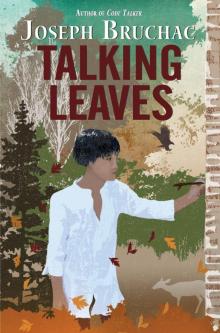 Talking Leaves
Talking Leaves Found
Found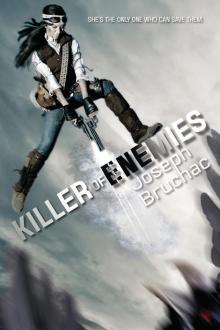 Killer of Enemies
Killer of Enemies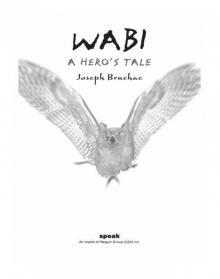 Wabi
Wabi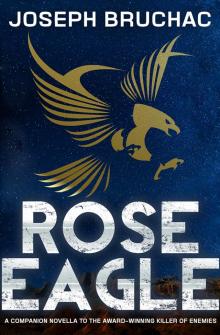 Rose Eagle
Rose Eagle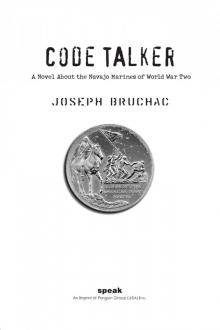 Code Talker
Code Talker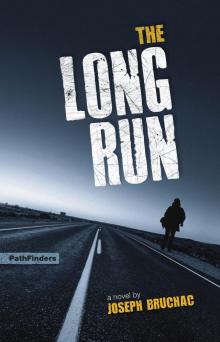 The Long Run
The Long Run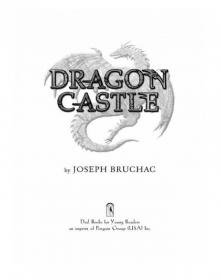 Dragon Castle
Dragon Castle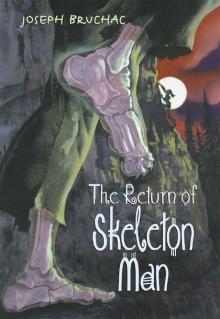 The Return of Skeleton Man
The Return of Skeleton Man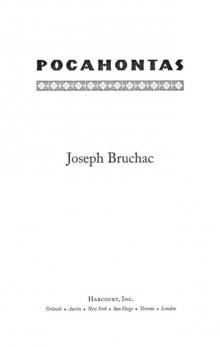 Pocahontas
Pocahontas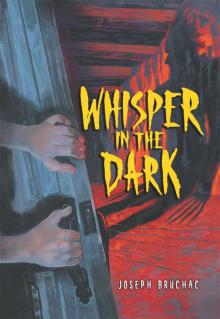 Whisper in the Dark
Whisper in the Dark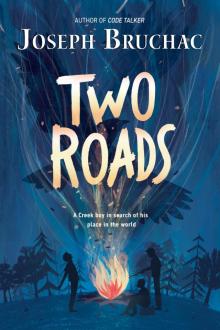 Two Roads
Two Roads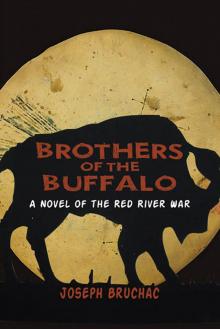 Brothers of the Buffalo
Brothers of the Buffalo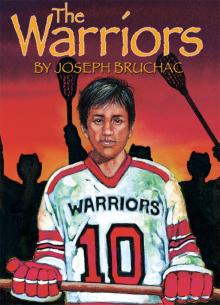 The Warriors
The Warriors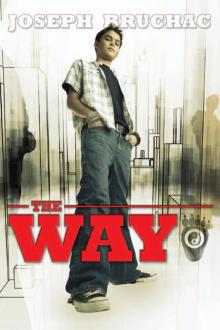 The Way
The Way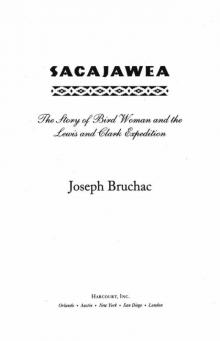 Sacajawea
Sacajawea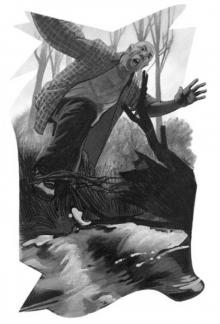 Night Wings
Night Wings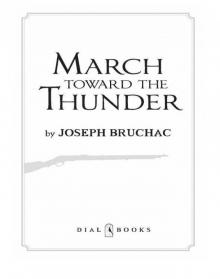 March Toward the Thunder
March Toward the Thunder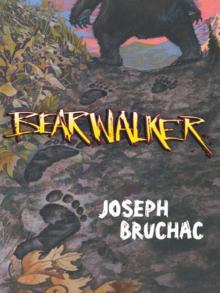 Bearwalker
Bearwalker Skeleton Man
Skeleton Man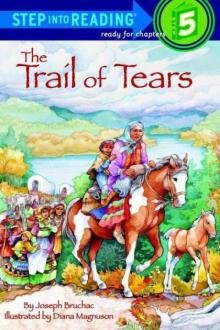 The Trail of Tears
The Trail of Tears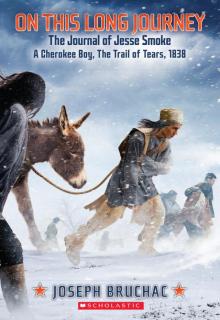 On This Long Journey
On This Long Journey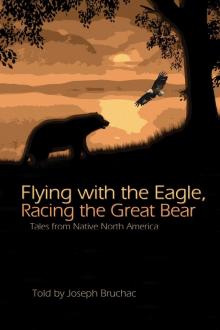 Flying with the Eagle, Racing the Great Bear
Flying with the Eagle, Racing the Great Bear